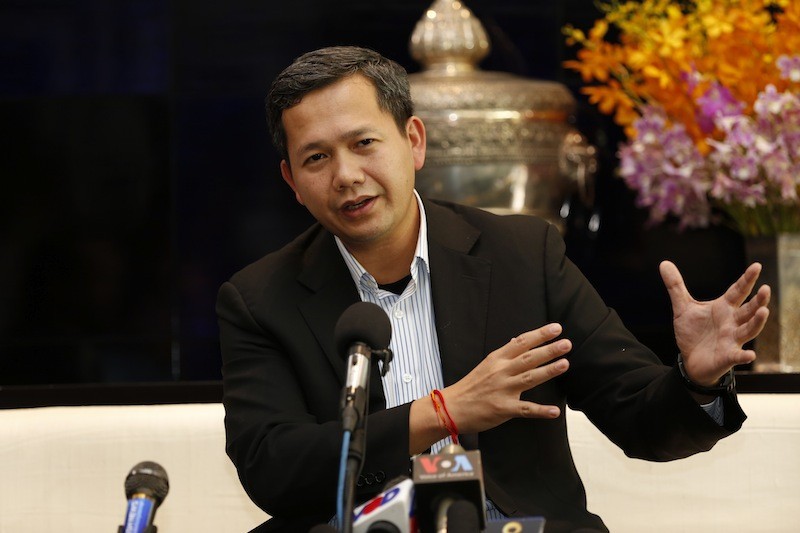Hun Manet’s U.S. legal woes will be exacerbated by a new law intended to allow victims of terrorism there to sue foreign states, according to a lawyer pursuing several cases against the lieutenant general, a claim disputed by his legal team.
The U.S. Congress overrode a presidential veto to pass the Justice Against Sponsors of Terrorism Act last week to allow victims of the September 11, 2001 attacks—and any subsequent acts committed on U.S. soil—to sue foreign states and officials who may have played a part.

Morton Sklar, an attorney representing CNRP official Meach Sovannara in a U.S. lawsuit against Lt. Gen. Manet, said on Monday that the act also strengthened his client’s terrorism case against the prime minister’s son for his alleged role in Mr. Sovannara’s “arbitrary, extralegal” 20-year imprisonment for insurrection.
“The new law makes clear that foreign governments and their officials cannot hide behind the claim of foreign sovereign immunity, and can be held responsible by U.S. citizen victims of acts of terrorism, which includes violent attacks and torture taking place either in the U.S. or abroad,” Mr. Sklar wrote in an email on Monday.
Mr. Sklar claimed that the statute would also apply to any case filed by opposition lawmaker Nhay Chamroeun, who was brutally beaten outside the National Assembly last year and announced last week that he too would file U.S. civil suits against Lt. Gen. Manet for his alleged involvement in the assault.
Three members of Prime Minister Hun Sen’s personal bodyguard unit are serving one-year suspended prison sentences for the beating. Mr. Chamroeun claims that Lt. Gen. Manet should be held legally accountable for the acts because of his senior position in the unit.
But Christopher Beres, a legal adviser for Sciaroni & Associates representing Lt. Gen. Manet in the case, cited language in the bill stating that the exemptions to foreign immunity only applied to instances of “physical injury to a person or property or death that occurs inside the United States.”
“Neither the incident involving Sovannara nor the one involving Chamroeun are alleged to have occurred on U.S. soil,” Mr. Beres wrote in an email on Tuesday. “This law, therefore, is inapplicable.”
“Furthermore, one could make the argument, as have many legal scholars and some of the congressmen who drafted it have done, that the law itself violates the legal principle of sovereign immunity, which is a basic and established principle in international relations and international law,” he added.
Mr. Sklar later contended that the law’s supporting provisions, including broader language on civil lawsuits against foreign governments, buttressed the thrust of his claims.
“The new law is based on the same principle of holding foreign governments accountable to victims for acts of torture, violence and terrorism that our case applies,” he said.
U.S. attorney Sam Zarifi, regional director of the International Commission of Jurists, said that the act “doesn’t directly relate to the Cambodian case,” but may signal that courts are more receptive to hearing it.
“What is clear is that the notion of foreign sovereign immunity is being whittled away by U.S. law,” he wrote in an email,
The cases against Lt. Gen. Manet have to clear several hurdles, Mr. Zarifi said: showing a cause of action, such as torture or terrorism, physically serving a notice of the complaint to the defendant, proving that U.S. courts have jurisdiction over foreign terror or imprisonment charges and defeating the U.S. government’s long-standing aversion to trying foreign governments.
Mr. Zarifi said that Lt. Gen. Manet’s biggest U.S. legal challenge may be a criminal case involving private investigator Paul Hayes, who attempted to serve a subpoena to the general during the latter’s visit to Long Beach, California.
Mr. Hayes claims Lt. Gen. Manet’s bodyguards attacked him as he approached their boss, causing extensive injuries. Lt. Gen. Manet claims that Mr. Hayes must have tripped and fallen, and denies ever receiving the subpoena.
However, his attorney said the case’s discovery process had unearthed “one very clear video showing the attack and the identity of the perpetrators very clearly.”